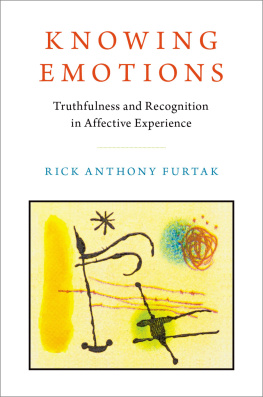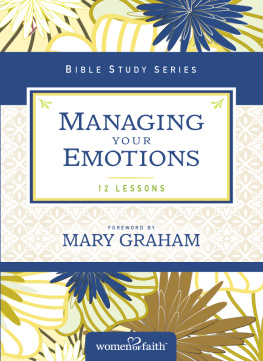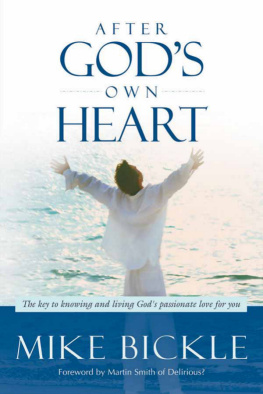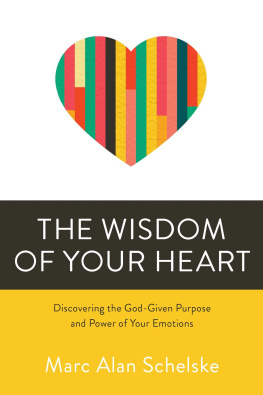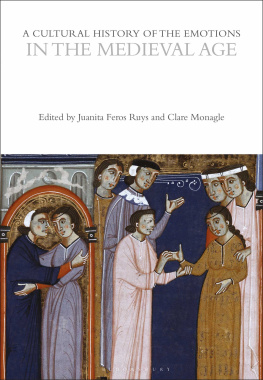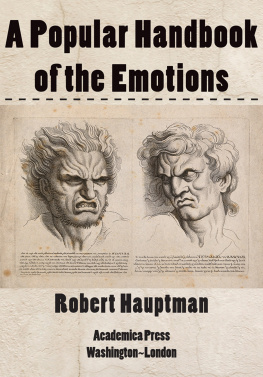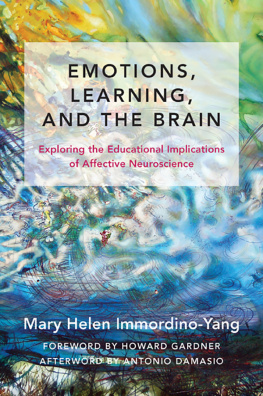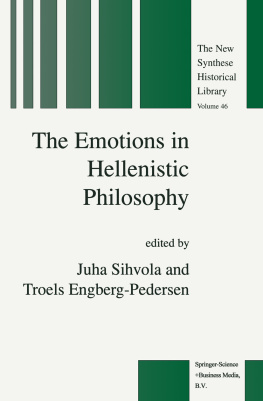KNOWING EMOTIONS

Oxford University Press is a department of the University of Oxford. It furthers the Universitys objective of excellence in research, scholarship, and education by publishing worldwide. Oxford is a registered trade mark of Oxford University Press in the UK and certain other countries.
Published in the United States of America by Oxford University Press
198 Madison Avenue, New York, NY 10016, United States of America.
Oxford University Press 2018
All rights reserved. No part of this publication may be reproduced, stored in a retrieval system, or transmitted, in any form or by any means, without the prior permission in writing of Oxford University Press, or as expressly permitted by law, by license, or under terms agreed with the appropriate reproduction rights organization. Inquiries concerning reproduction outside the scope of the above should be sent to the Rights Department, Oxford University Press, at the address above.
You must not circulate this work in any other form and you must impose this same condition on any acquirer.
Library of Congress Cataloging-in-Publication Data
Names: Furtak, Rick Anthony, author.
Title: Knowing emotions : truthfulness and recognition in affective
experience / Rick Anthony Furtak.
Description: New York, NY : Oxford University Press,
United States of America, [2018] | Includes bibliographical references and index.
Identifiers: LCCN 2017030834 (print) | LCCN 2017033766 (ebook) |
ISBN 9780190492052 (updf) | ISBN 9780190492069 (online course) |
ISBN 9780190862077 (epub) | ISBN 9780190492045 (cloth : acid-free paper)
Subjects: LCSH: Emotions. | Perception. | Cognition.
Classification: LCC BF723.E6 (ebook) | LCC BF723.E6 F87 2018 (print) |
DDC 152.4dc23 LC record available at https://lccn.loc.gov/2017030834
This book is dedicated
to my friends
and family members
and, especially,
to Maria
(with love)
CONTENTS
PART I
THE RATIONAL AND THE PASSIONATE
PART II
ON REASONABLE FEELINGS AND EMBODIED COGNITION
PART III
THE REASONS OF THE HEART
These acknowledgments cannot possibly do justice to the many persons upon whom I have depended while writing this book. (One way to have written these pages would have been simply to thank all of the medical doctors who have kept me alive, and to whom I am grateful.) I will inevitably fail to thank adequately those whom I mention, and to say thanks to everyone who deserves this. One must, Im afraid, be patient and forgiving in order to remain among the friends whom I decided are the most appropriate dedicatees of this text.
For some time, I was planning to have two women whom I admire share the dedication; although I changed my mind about this late in the day, the thought is still worth noting. M. C. N. and K. A. N. have influenced my life and thought profoundly over the past two decades. I thank them both.
This book has been shaped by unusual circumstances, and the writing of these acknowledgments is no exception. When I look back at the acknowledgments page in my first book, I am astonished by the reminder of how many people in my intellectual community at the time had shaped my way of thinking. The only parallel I can draw to that incredibly stimulating environment, in my more recent experience, is the world of ideas that I share with my undergraduate students. Yet to thank individually more than a handful of current and former students would require drawing an inevitably arbitrary line between those named and the rest. So I will say here only a brief word of thanks to all of the Colorado College students who have taken my Philosophy of Emotions course over the past decade or so, for all that they have taught me.
I ought to have admitted earlier a debt to my undergraduate mentors decades ago, Victor Kestenbaum and Christopher Ricks. Their traces are evident in many places here. Those who have helped me most recently, even reading in rapid fashion a draft of the very final chapter, are Ulrika Carlsson, an incisive critic who has led me to clarify a number of things, as well as James D. Reid, a brilliant author and kindred spirit whose judgment I trust almost more than my own, and who is my number one most significant philosophical interlocutor. Sharon Krishek must have been separated from me at birth, although we were born six months apart across the world from each other, because no one else has ever been such a philosophical twin. Heather Churchill, Troy Jollimore, and J. P. Rosensweig provided crucial feedback on some or all of these chapters, aiding my final revisions. Finally, Maria Alexandra Keller has become a friend whose point of view matters more than I could say, and from whom I have learned much. Special thanks to each of them. Other friends with whom Ive had critically important discussions related to the themes of this book include Nicole Hassoun, Alyssa Luboff, Madeline Mindich, Willow Mindich, Edward F. Mooney, and Sarah Pessin.
Within the hospitable environment of Colorado College, I am grateful to my discussions with George Butte, Helen Daly, Marion Hourdequin, Jonathan Lee, David Mason, and John Riker.
Individual conversations with philosophers less familiar to me have been crucial, especially when they have taken place when I was taking them from the Denver airport to my campus an hours drive from there. For this reason I am grateful to Robert Audi, Cheshire Calhoun, Ronald de Sousa, Jesse Prinz, and Matthew Ratcliffe. Innumerable dialogues with Tomi-Ann Roberts have been more significant for this project than those with any other colleague at my home institution, and helped open my eyes to the rich possibilities of doing interdisciplinary research on emotion.
Those were the short lists. Charlotte Allyn, Matthias Barker, Aaron Ben-Zeev, the late Ted Cohen, Ben Crowe, Vita Emery, the late Matthew Geiger, Eleanor Helms, Andrew Henscheid, Sara Huizenga, Chad Kidd, Y. Mike Kim, Lior Levy, Teelin Lucero, Kym Maclaren, Jean-Luc Marion, Jennifer McWeeny, Ann V. Murphy, Julie Piering, Robert C. Roberts, Anthony Rudd, Camisha Russell, Shahrzad Safavi, Emma Schiestl, David Stevens, Ella Street, Maria Talero, Iain Thomson, Kate Withy, Dave Young, and Dan Zahavihave assisted my thinking, in some cases by simply asking a question after a talk. A nameless reader for Oxford University Press also made helpful suggestions, and I am particularly thankful to Lucy Randall for being such an exemplary editor throughout the process of bringing this to birth in its present form.
Cal Poly in San Luis Obispo, the Center for Subjectivity Research in Copenhagen, Colorado College, Northern Arizona University, Ryerson University, Syracuse University, the University of Colorado, Denver; and, the University of Haifa: at each of these institutions some of this text was presented, and in each case there were valuable comments made by members of the audience whose names I have not mentioned and may not know. The same is true of both times that I presented parts of the manuscript-in-progress at the Southwest Seminar in Continental Philosophy, and when I did so twice at the International Society of Research on Emotion.
Let me acknowledge Kate Barnes for her fine, dedicated work in preparing the index, and Colorado College for providing summer funding for the collaborative research grant that enabled Kate to be hired as my assistant.
incorporates and expands upon my Love as the Ultimate Ground of Practical Reason, which appeared in

